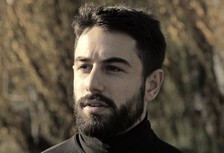
Jug K. Marković (1987, Serbia) was born in Belgrade, where he graduated from the composition classes of Vlastimir Trajković and Zoran Erić at the Faculty of Music. He also holds a degree in archaeology from the Faculty of Philosophy. Beside Serbia, his music has been performed in France, Belgium, Italy, Germany, Austria, Slovenia, Iceland, the US, and elsewhere, at major festivals such as Donaueschinger Musiktage (2014) and Festival d’Aix-en-Provence (2016), which commissioned his work Ultraterreno. Marković has attended master-classes with renowned composers such as Enno Poppe, Mark Andre, Fabien Lévy, John Corigliano, and Raphaël Cendo, and attended summer contemporary music academies at Darmstadt (the 47th Internationale Ferienkurse für Neue Musik), Paris (ManiFeste IRCAM), and Graz (11th Internationale Komponistenakademie für zeitgenössische Musik), where he collaborated with Klangforum Wien, the famous Austrian new music ensemble, on his piece motherTongue. With his piano piece Egon, Marković won the third Anton Matasovsky Composers Competition in Vienna (2017); with Hydra, he won first prize at the International Composition Competition in Hong Kong (2016); finally, his work Magistralen won a special prize at Busan Maru International Music Festival in South Korea (2016) as well as a Josip Slavenski Award (2015). He is an active participant in residencies and programmes organised by ENOA (European Network of Opera Academies), Britten-Pears Young Artist Programme (Snape Maltings, Great Britain), TENSO (European Network of Professional Chamber Choirs), etc.
Vokativ(Vocative). I like to think that, fascinated by certain objects from the past, I allow them to direct me and then, through a quite consciously subjective interpretation and perception, in the process of a new creation, I spontaneously re-form something that I heard and liked before. In that spirit, like most of my works so far, Vokativ openly harnesses its energy from various musics of the past that keep impassioning me. In this work, as well as in my previous works, I did not try to distance myself from obvious influences of specific composers as well as certain general aesthetic and stylistic positions. Although seemingly eclectic in style and aesthetically incoherent, this music’s main connective tissue is precisely its stylistic diversity, which constitutes its chief dramaturgical building material. This manipulation with various types of expression is precisely the main factor in its form and musical flow.


